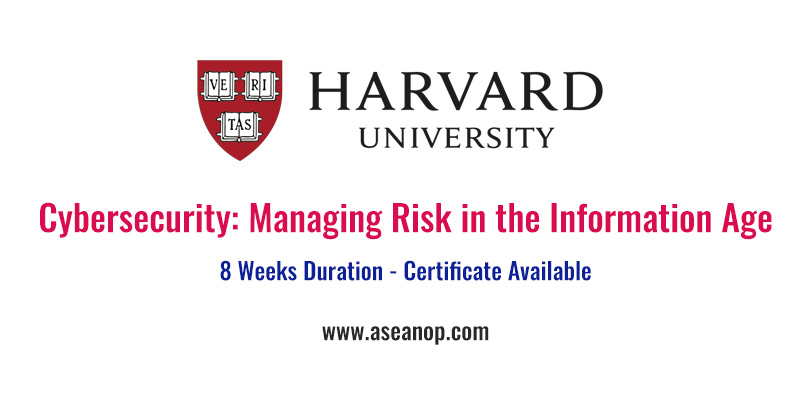Harvard University Cybersecurity: Managing Risk in the Information Age

Develop your personal cybersecurity leadership plan.
About this Course
Duration: 8 weeks (excluding orientation)
News of large-scale cybersecurity threats and cyberattacks frequently dominate the headlines: hackers exploiting vulnerabilities of retail giants, foreign influence in elections, and new forms of ransomware underscore the importance of preparing for these threats.
Cyber risk management has become a fundamental component of business operations, and understanding and mitigating risk has become an essential skill for business leaders, analysts, as well as security and technology specialists.
The Cybersecurity: Managing Risk in the Information Age online short course from Harvard’s Office of the Vice Provost for Advances in Learning (VPAL), in association with HarvardX, equips you with a comprehensive understanding of how to identify and manage operational, litigation, and reputational risk. Over eight weeks, you’ll learn how to conduct a vulnerability assessment and mitigate web and network security vulnerabilities within an organization’s networks, systems, and data, and explore strategies for responding to a cyberattack. Develop the knowledge and skills to protect the integrity and confidentiality of digital assets with this cybersecurity course.
This online short course offers an in-depth exploration of cybersecurity that is valuable for executives and specialist roles such as cybersecurity analyst, security administration, or information security manager. Business leaders will gain the knowledge needed to lead their organizations through the complexities of the cybersecurity landscape, and develop the know-how to set appropriate budget guides for this task. This web security-focused online course will also allow cybersecurity professionals, risk analysts, technology specialists, and information security professionals the opportunity to build confidence and understanding in a key area of importance for their roles. Other professionals will benefit from gaining an up-to-date overview and understanding of cybersecurity and risk.
Learn cybersecurity fundamentals of systems and network security
Explore cybersecurity fundamentals of systems and network security and how to protect an organization’s digital assets from cyberattacks. A cybersecurity course teaches business leaders how to lead their organizations through the intricacy of the cybersecurity landscape and improve cybersecurity skills.
Grow your confidence and understanding
With cybersecurity threats on the rise, so too is awareness around these threats and attacks. As a business leader, executive, or specialist, it is essential to have an understanding of cybersecurity to protect your organization from a potential cyberattack and its associated risks. The Cybersecurity: Managing Risk in the Information Age online short course from Harvard’s VPAL provides you with the knowledge and skills to confidently lead your organization through the cybersecurity landscape.
What are common types of cyberattacks?
Data breaches and cyberattacks come in many forms, and there are many common types of attacks that you should be aware of. One common type of cyberattack is phishing, a technique used to obtain digital information such as passwords or credit card details by pretending to be a trustworthy entity by using electronic communication. Cybercriminals often use phishing emails as the initial entry point into a network to steal data or install malware. Malware is another common type of cyberattack and refers to software designed to disrupt or gain unauthorized access to a computer. A cybersecurity course is a great way to gain an understanding of cyberattacks and improve cybersecurity skills.
Protect networks and computer systems
It’s important that business leaders and cybersecurity professionals, such as a cybersecurity engineer and security architect, protect networks and computer systems from unauthorized access and cyber threats. Data breaches and cyberattacks can have a devastating effect on individuals, businesses, and governments, making data integrity a key issue for organizations.
Ensure data integrity
Data integrity is the assurance that data has not been changed or corrupted in any way, accidental or intentional. This cybersecurity course can equip you with cybersecurity awareness, understanding, and skills to develop and lead your organization’s cybersecurity plan.
Course curriculum
Learn from cybersecurity experts and guest speakers as you work through the weekly modules of this online course.
Orientation module: Welcome to your Online Campus
Module 1: Cybersecurity risk is business risk
Module 2: Identifying the threats to an organization
Module 3: Identifying important business systems and assets
Module 4: The crucial role of leadership in managing cyber risk
Module 5: Understanding your technology
Module 6: Cyber risk and the law
Module 7: Incident response and accountability
Module 8: Designing and implementing a mitigation strategy
